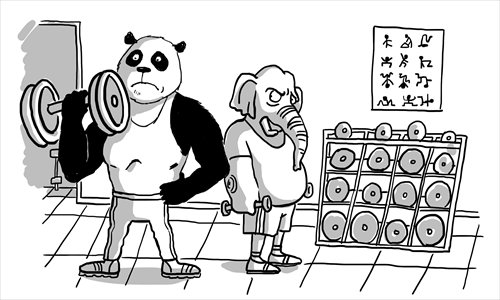India needs big self-confidence boost

The second round of the India-China Strategic and Economic Dialogue was held in New Delhi on November 26. Strategic cooperation should be based on mutual trust. Both China and India haven't greatly improved their relationship in recent years, mainly due to a lack of mutual trust.
Building that trust lies with the countries themselves. External factors are not the key reasons for this lack of confidence. Any nation, as long as it trusts in its national development and strength and has broader strategic vision, it will not hold strong strategic mistrust on others when developing relations.
A measure of vigilance is necessary when cooperating with others, but too many suspicions will damage the strategic balance and affect the establishment of mutual trust. At present, a few factors have been influencing the ties between China and India. Economic, political and military factors have become entangled and, coupled with historical barriers, have prevented the two moving closer. Border security is one typical example.
But all these factors are related to how China and India view their own development. A country's opinion of its neighbors in essence reflects its own self-assessment. Growing national strength could bring confidence, while a disparity in power could fuel more suspicions.
The mutual trust between China and India to a large extent depends on their balance of power. Both countries have a large population, are positioned in the same stage of development and have similar outlooks for their future. Therefore, a strength disparity is considered a vitally important factor.
Traces of history could easily be found in present-day relations between neighboring countries. Against the background of a changing balance of power between China and India, lingering historical issues will become prominent and potentially turn into real problems today.
Whether the dragon and elephant can dance together depends on whether they are in sync. To perform a harmonious dance requires the two to match the other's skills and strengths.
India needs to increase its confidence in Sino-Indian cooperation, but it should first become more confident in its self-development. I have spoken with Indian scholars and media personalities. Generally speaking, India's domestic economic situation wields a great influence on their impression and attitudes on China. They admire China's development, but also worry over historical and boundary issues. However, they have the common view that India should further accelerate its reform and open its market.
Ordinary Indians may feel China is increasingly looking down upon them. They think China may get tougher on boundary issues with their country. However, the Chinese public often holds that with China's strength growing, India is likely to join hands with the US or others to deal with and balance China out.
Nowadays, more and more Chinese have the opportunity to visit India either for business or tourism. They observe and experience India by themselves and develop their own understanding of the country.
But from the perspective of Chinese diplomacy, China treats India as a big power. Any neglect of this huge neighbor will be considered to be a shortsighted strategy.
Consolidating and developing the Sino-Indian strategic partnership needs the creation of common interests. China and India should learn from each other.
For China, its confidence in cooperating with India is mainly determined by looking ahead, while for India, such confidence comes more from real trust in its own development.
The author is a senior editor with the People's Daily. He is currently stationed in Bangkok. dinggang@globaltimes.com.cn